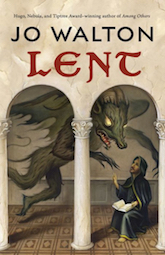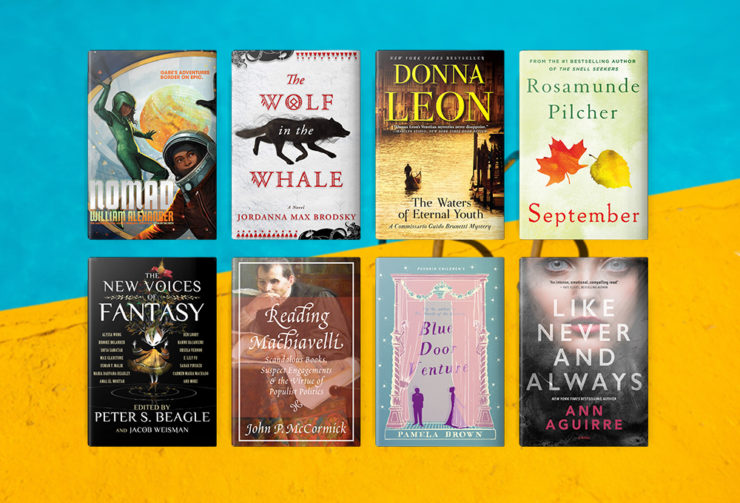July was a busy month—I was home for the first week and then I was off travelling to France and Italy, lots of looking at art and places and not all that much time for reading. I read just 14 books.
The Wolf in the Whale, Jordanna Max Brodsky, 2019.
This is weirdly great. It’s a novel about the Vinland saga, from the Skraeling, First Nation point of view. It reminded me in some ways of the movie Atanarjuat and of nothing else at all. It has interesting gender and identity issues, with the female bodied person brought up as male. It has terrific real-feeling Inukiak culture. But the author isn’t herself Inukiak, and I felt weird that they were portrayed as if their way of life is timeless, while Scandinavia and Iceland are not still the way they were in 1200 when the Vikings went to North America. I alternated between being utterly absorbed in the plot and feeling uncomfortable. The fantasy part of this is terrific. The first person narrator is wonderful. It’s very very long, but not at all too long. There certainly isn’t anything else like it.
Nomad, William Alexander, 2015.
Brilliant sequel to Ambassador, which I talked about last month. Topical, terrific, excellent. But read that first. And both SPOILER warning and politics warning: How did we come to the point where the happy ending to a children’s book is the kid hero and his alien friends rescuing Mexican kids from a detention centre on the U.S. border? How did we get here? This is not OK. The book is great. The real world needs some serious fixing.
The Histories, Tacitus, 110.
Re-read. Covers what happened in the immediate aftermath of Nero’s assassination, and goes on from there, though unfortunately not as far as one might wish. Detailed, interesting primary source.
The Waters of Eternal Youth, Donna Leon, 2016.
Another volume of the series about Brunetti, the Venetian detective, his family, friends, colleagues, and city. It’s good and I enjoyed it, but don’t start here, and it isn’t doing much new.
The Rainbow and the Rose, Nevil Shute, 1958.
Re-read; bath book. Nobody ever talks about Shute as a stylistic innovator, but he was. This is a simple story of the life of a man who flew planes and loved women through the first half of the twentieth century, three eras of plane tech, and three relationships with women. But it’s told from the POV of his friend and former apprentice who is sleeping in his bed and dreaming his life, while he himself is hovering between life and death in a remote place in Tasmania. The balance of narrative between the present thread and the dreamed past sections, the difference in narrator personality, and the way the story ratchets is what lifts this out of the ordinary—and it makes it almost fantasy, because it’s taking “but it was all a dream” and making that a feature. It’s also almost SF because of the engineering. And it’s fairly unusual to blend plane tech and gently unhappy romance.
Buy the Book


Lent
Like Never and Always, Ann Aguirre, 2018.
Utterly riveting YA novel about a young girl who is in a car accident and dies, but finds herself in her best friend’s body and everyone thinks she is the best friend, and is consoling her for her own loss, and she has to cope with that and go on from there. Compelling and addictive, read very fast. I subsequently bought all of Aguirre’s backlist, but on reflection these are probably things I want to space out a bit, as I did feel a little as if I’d eaten a whole kilo of chocolate ice cream. It did have the infuriating trope of having hugely rich people and luxury and money solving problems, but apart from that this was great.
Stories From Tagore, Rabindranath Tagore, 1918.
Marvellous short story collection from Nobel Prize-winning author. These were written and set in early twentieth-century India, and they were delightful. No speculative elements, just small, well-drawn and satisfyingly told slices of life. Free from Gutenberg, and highly recommended.
The Secret Ingredient, Ciro Camilli, 2019.
A book written by the co-owner of the Perche No!… gelateria in Florence, about gelato, life, Florence, family, authenticity, and his experiences creating flavours and running a business. It’s the kind of memoir you don’t normally see because the author isn’t famous, but it’s delightful. Read as a codex. Gift from the author: I went in to Perche No!… to give them a copy of Lent as soon as I arrived in Florence, and Ciro reciprocated with this, and he was so proud. You’re probably not going to be able to get hold of it—it’s not on Amazon and I put it on Goodreads myself, so I’ll give you a spoiler: The secret ingredient is joy.
Mesmerism and the End of the Enlightenment in France, Robert Darnton, 1968.
One of Darnton’s early books, and while it was good it wasn’t as compelling as some of his others. His point here is that immediately before the French Revolution everyone suddenly became obsessed with the craze of mesmerism—a kind of pseudoscience or pseudomedicine, and nobody pays any attention to this but it’s one of the ingredients of what happened subsequently.
Blue Door Venture, Pamela Brown, 1949.
The fourth of the Blue Door books (other three previously discussed in earlier months) and one I’d never read and have wanted for years. I read it in two hours the day it was released, and sadly, I am disappointed. I wanted another book like Golden Pavements about life in theatre, and instead this is mostly an unrealistic and lacklustre book about the protagonists being swindled and then tracking down the swindler. As I’ve already read the fifth volume, years ago when I was a kid, I now know I will never have the book I wanted this one to be. Rats.
Reading Machiavelli: Scandalous Books, Suspect Engagements, and the Virtue of Populist Politics, John McCormick, 2018.
I like history much more than I like political science, and so I was slightly disappointed when this book became completely political science in the second half and engaged with Rousseau and Strauss’s readings of Machiavelli. Well written and lively, but not quite what I wanted.
Harvard Classics: Essays of Francis Bacon, 1909.
All right I suppose, but so much less good than Montaigne, who he is obviously imitating here, that I kept having the feeling of “is this all?”
September, Rosamund Pilcher, 1990.
Some of Pilcher’s shorter works are romances, but her longer ones, like The Shell Seekers and this, are stories of families and women’s lives over time. This one is set mostly in Scotland, with parts in London and Majorca, has a large cast of characters of all ages, and it’s mostly satisfying but did not benefit from being read in small pieces while travelling. I usually enjoy Pilcher but this felt a little disappointing.
The New Voices in Fantasy, Peter S. Beagle (Ed.), 2017.
My goodness this was great. My sole complaint about it is the ebook formatting doesn’t have a proper ability to move to and from the table of contents or from one story to another, it’s all the same “chapter,” gah. But the contents are phenomenal. It’s a book of short work from people who were all first published after 2010, and the general level here is stellar. There’s amazing work here from Amal El-Mohtar, Eugene Fischer, Sofia Samatar, and Carmen Maria Machado. The basic level of this anthology is so high that I could single out almost any of the stories as one of the best. Terrific stuff. Loved it. Then, at the end, comes Usman T. Malik’s novella The Pauper Prince and the Eucalyptus Jinn, which blew me away. This is simply one of the best things I have ever read, and I am deeply disappointed to find that he’s not yet published anything at long length. Brilliant writer, one to watch out for and buy everything instantly forever. The title does the story no favours, because it makes it seem like it’s going to be a flavoured fairytale of the kind that can be good but isn’t exciting. Instead it’s a well-observed and very human character story that also has genuinely exciting metaphysics. Read this!
Jo Walton is a science fiction and fantasy writer. She’s published two collections of Tor.com pieces, three poetry collections, a short story collection and thirteen novels, including the Hugo- and Nebula-winning Among Others. Her fourteenth novel, Lent, is newly out from Tor on May 28th 2019. She reads a lot, and blogs about it here irregularly. She comes from Wales but lives in Montreal. She plans to live to be 99 and write a book every year.










